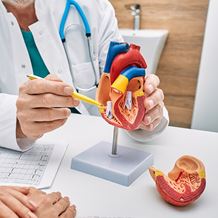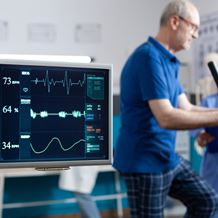
- Home
- Services
- Cardiac Services
- Recovery
- Coronary Artery Bypass Surgery (CABG) Recovery
Coronary Artery Bypass Surgery (CABG) Recovery
Coronary Artery Bypass Surgery (CABG) also referred to as Cardiac Bypass Surgery, is a major procedure, and recovery will look different for every patient. Much of it will depend upon your age, health and wellbeing coming into the operation, and how well you commit to your own recovery and rehabilitation. Taking an active role is crucial to achieving the best possible outcome – and this starts right from the moment you decide to have surgery. Rehabilitation is a vital part of your recovery process, and our specialist cardiac rehabilitation team are here to support you at every step as you regain strength and return to health. Please ask about our dedicated cardiac rehabilitation program that you can access through your hospital.
Home preparation for Coronary Artery Bypass Surgery
Preparing for surgery is an important part of the recovery process. As you will be in hospital for approximately one week after Coronary Artery Bypass Surgery, it’s important to ensure you have a supportive environment on your return home. Leaving the security of the hospital environment can feel overwhelming at first, and it is completely normal to experience some emotional swings as you recover.
Arrange for someone to help you get home from hospital and your medical team will provide you with resources that include information on:
- Your medication requirements
- Any help or special considerations that may be required at home such as food preparation and sleeping arrangements
- How to set up a recovery space
- How to bathe
- How to care for your wound after surgery
- What symptoms to look out for after surgery
- Your individualised rehabilitation program
Your recovery from Coronary Artery Bypass Surgery
After your Coronary Artery Bypass Surgery is finished, you will be moved to intensive care where you will be closely monitored for 1-2 days before being transferred to the ward. At first, you will be connected to a number of tubes and wires that help you breathe and manage the pain. These will slowly be removed as you improve. You are likely to be in hospital between 5-7 days depending on the extent of the surgery and your health coming into the operation.
Your doctor may recommend that you attend a cardiac rehabilitation program to help with your general recovery from surgery. Here you will benefit from a team of trained healthcare professionals including doctors, nurses, dieticians, physiotherapists, and social workers that will all guide you through the recovery period. This dedicated team will help evaluate your personal needs, including any emotional support you may require after surgery, as well as talk to you about the tools and strategies that aim to get you back to a healthy and active lifestyle. These include:
- Any risk factors – such as smoking, diet and anxiety or depression
- Medication requirements
- What to expect at each stage of your recovery
- How your family and friends can support your rehabilitation
- How to meet your personal recovery goals
- How to move around and protect your breastbone after surgery
- How to avoid the risk of another cardiac event
What to look out for at home
With any cardiac event, it is very common to experience emotional instability as you leave hospital and come to terms with what has happened. Many patients feel a sense of anxiety about what the future may hold. Talk to your healthcare team and others who have experienced similar circumstances for additional comfort and reassurance. There are also some common physical side effects after Coronary Artery Bypass Surgery that may include a loss of appetite, constipation, swelling, chest pain, tiredness and difficulty sleeping as well as mood swings. These should subside over the next six weeks. Talk to your doctor if you experience:
- Persistent chest pain
- Irregular heartbeat or palpitations
- Fever
- Rapid weight change (over 2kg in 24 hours)
- Dizziness, fainting or extreme fatigue
- Worsening shortness of breath
- Nausea and vomiting
- Wound infection
- Clicking or movement of the breastbone
- Weight loss or appetite change
Average Recovery Timeline
Week 1
- Patients will be transferred to the ward after a period in intensive care
- Sitting up is encouraged, walking will begin as it is safe to do so – usually a week after surgery, and managing stairs after 5 or 6 days
- Most patients are likely to return home at the end of the week, with an individualised rehabilitation program
- You may experience some pain or numbness around the incisions
Weeks 1-3
- Light activities are encouraged and can be built up over time
- You will be able to walk increasingly longer distances
- Avoid lifting heavy objects
- Avoid any kind of stress that can impact your heart health
Weeks 4-6
- Any painful symptoms should have improved
- Talk to your doctor about a return to driving after the 6th week
- Light gardening can progress to more vigorous activity
Week 6 +
- Your sternum does not reach healing until 10-12 weeks after surgery
- Normal activities such as household tasks may resume
- Talk to your doctor about returning to light office duties
- A return to some light sport may be possible such as tennis
- Regular exercise may resume after 10 weeks
A full recovery can take up to 3 months, at which stage patients are encouraged to resume all usual activities. Always check with your treating doctor before trying anything new.
Lifestyle changes
After cardiac bypass surgery it is still necessary to make lifestyle adjustments to address the underlying heart condition and help slow the progression of disease. As part of the cardiac rehabilitation program, patients will have access to dietary guidance and advice on the importance of regular exercise and maintaining a healthy weight. Patients are strongly advised not to smoke, and to adhere to any medication as prescribed by your doctor.
Coronary Artery Bypass Surgery (CABG) Recovery FAQs
What's next?
If you have been experiencing heart-related symptoms, book an appointment with our cardiac services specialist today.
Our specialists in Cardiac Services
View all specialists
Related content

Cardiac Services
Cardiology services at St Vincent’s Private Hospitals, advanced cardiac care.
Read More
Coronary Artery Bypass Graft Surgery
Restores blood flow to the heart by using healthy blood vessels to detour around any blockages.
Read More
Recovery
Cardiac recovery and rehabilitation programs are designed to help you after surgery.
Read More

